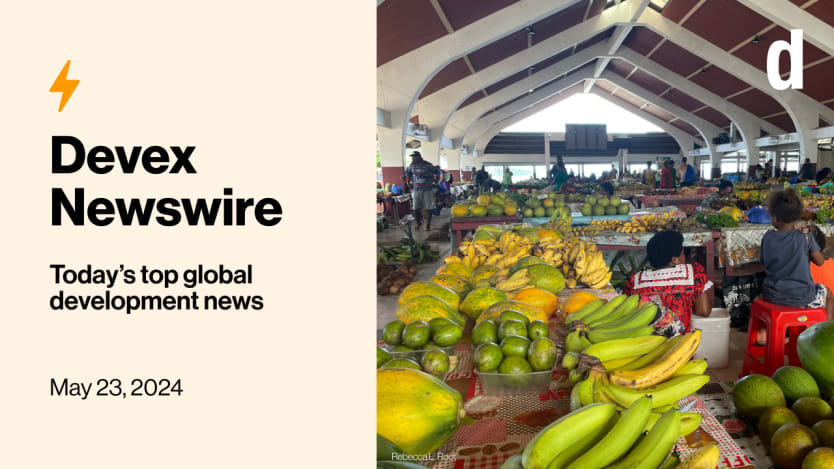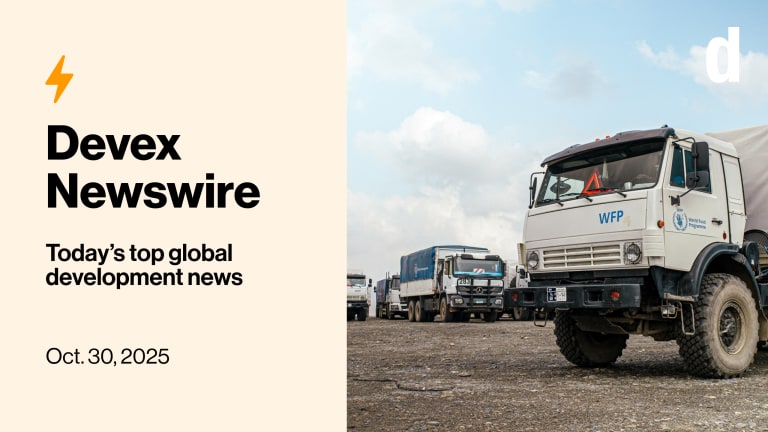
In the tiny island nation of Vanuatu, international agencies are working backward. By drawing on traditional wisdom to boost communities’ resilience to climate change, many are hoping the past will pave the way for the future — and in a world of multiplying droughts, storms, and cyclones, for countries like Vanuatu, the stakes could not be higher.
Also in today’s edition: A push to support farmers in Sudan, a trend of dissolving generosity in Europe, and how the world spent nearly $450 billion on the SDGs.
+ Devex World is making a return this year! Take advantage of our early-access pricing today and get your ticket at a reduced price to join us on Oct. 24 in Washington, D.C. and connect with leaders shaping the future of global development.
Respect the yam
As climate change continues to rear its head in Vanuatu, many in the island nation are turning to the past — and attempting to marry age-old preservation practices with the technology of today.
This is a preview of Newswire
Sign up to this newsletter for an inside look at the biggest stories in global development, in your inbox daily.
“There are local ways of improving food security that might have been ignored in the past and a recognition that they need to be included in planning for the future,” Federico Dávila Cisneros, a research director at the University of Technology Sydney, tells Devex contributor Rebecca Root.
Across the archipelago, that’s meant using techniques that have always worked — like the ancient mara method, where bananas are drained, buried, and preserved for up to two years — as inspiration for technology-driven approaches, such as a new Save the Children project that uses solar dryers to dehydrate fruits and vegetables. Anything the community doesn’t need is then sent to a local supplier, who packages the food into a shelf-stable, preservative-free product that can be used in the wake of a disaster.
“Food preservation is not a new concept. It's been around for thousands of years, but it's being able to utilize these different methods of food preservation using modern technology,” says Save the Children’s Kali Ameara, who founded the project with a 16-household community on the island of Nguna.
That’s also meant rethinking indigenous crops, and rolling out new methods, varieties, and techniques to grow the vegetables that people love — and in the case of the yam, respect — on the 80-island archipelago. In 2021, scientists created a pest-resilient “golden yam,” one that grows at a faster rate than its predecessor, and is more resilient to climate shocks and diseases. And today, organizations are exploring how water taro, a root vegetable that bears cultural significance in the country, can be grown through drip irrigation systems.
Read: How tech and tradition are cyclone-proofing Vanuatu's food systems
Related reading: How bringing back indigenous crops can help solve the food crisis
+ For more content like this, sign up to Devex Dish, a free, weekly newsletter on the transformation of the global food system.
Sudan’s ‘doom loop’
Nearly 10,000 miles from Vanuatu, food is also on the minds of those in Sudan — a country that for more than a year has been ravaged by conflict and instability. Since a civil war broke out last April, almost 9 million people have been forced from their homes, and millions more are on the verge of famine.
But according to some experts, it’s not just humanitarian aid that’s needed. It’s development assistance, and the stabilization of farming systems across the conflict-ravaged country.
“Restoring food production within the country is just as important — otherwise donors risk racing from crisis to crisis and always falling short,” write Mercy Corps’ Sibongani Kayola and the International Maize and Wheat Improvement Center’s Bram Govaerts in a recent opinion piece for Devex. “It is time to break away from an aid-dependency model and invest directly in farmers.”
“Sudan, as with many war-affected nations, is caught in a doom loop of insecurity: Any restoration of political stability requires economic activity, but any economic activity requires political stability,” write Kayola and Govaerts. “While a cessation of violence and the restoration of civil order is ultimately up to the parties to the conflict, a direct, international investment in farmers is a way to potentially break the cycle.”
Opinion: Aid competes with long-term solutions to Sudan’s hunger crisis
ICYMI: Sudan — Warnings of an invisible crisis on the brink of 'mass atrocity'
Breaking the bank
Whether it be the old practices or the new, one thing is clear: With rising conflict and increasing instability, the world seems to need more help now than ever before. But over the last few years, many of Europe’s largest donors — from the United Kingdom to Germany — have been slashing their aid budgets. What’s going on, and why is this happening?
It comes down to a combination of economics, politics, and geography, Devex’s David Ainsworth says after hosting a Devex Pro event on the topic. Between a growing budget deficit in Europe, an increase of aid within the region’s own borders, and an outpouring of money going toward military and economic support for Ukraine, even some of Europe’s most generous donors seem to be tightening their purse strings.
“In Germany, there is one very well-known project,” said Stephan Klingebiel, the head of the inter- and transnational cooperation research program at the German Institute of Development and Sustainability, a German think tank, at the event. “I think almost everybody knows it: bike lanes for Lima in Peru. And this is an illustration for the most important right-wing party in Germany to illustrate, look, we can't afford to have our own bike lanes in Germany, but we are constructing them in Lima. And is it really something we should do?”
Panelists warned there was the potential for further cuts in future years — in other countries, as well as those where cuts have already been seen.
“I think we need to be concerned,” Klingebiel said. “This will not go away.”
Watch: Why are billions being cut from European aid budgets? (Pro)
+ Devex Pro members can also read our in-depth reporting on aid budget cuts this year by some of Europe’s biggest donors, such as Germany, France, and the U.K.
Not yet gone Pro? Start your 15-day free trial today to read all our exclusive reporting and analyses as well as to get access to members-only networking events.
Cool Tory, bro
In the United Kingdom, that’s exactly what our U.K. Correspondent Rob Merrick is watching for: The country will stage a general election on Thursday, July 4, after Prime Minister Rishi Sunak pulled a surprise by accelerating a vote long expected to take place in October or November.
Sunak’s Conservative Party is around 20 points behind in the polls and facing near-certain defeat at the hands of a resurgent Labour, led by Keir Starmer. The announcement leaves Starmer in a race to plug gaps in his manifesto — including in his future international development policy, where there are unanswered questions about structure and spending.
Keep an eye out for future analysis from Rob on what the election will mean for global development.
Related reading: What the aid sector wants from the next UK government (Pro)
+ Check out our page with all the latest news in the U.K. aid sector.
Follow the money
When money is being spent, where is it going — and which of the Sustainable Development Goals has gotten the biggest slice of the pie? The same three SDGs took home the most money in 2022 and 2021, my colleague Miguel Antonio Tamonan tells me: SDG 17, partnerships to achieve the goals; SDG 3, good health and well-being; and SDG 7, affordable and clean energy.
That’s according to data from the Total Official Support for Sustainable Development task force, or TOSSD, which aims to collect and report the resources spent to support the SDGs. In total, nearly $450 billion was spent on the SDGs, a 15.2% increase in official sources from 2021, and a 29.6% rise in private sector mobilization — though that is partly due to more countries reporting to TOSSD in 2022 than the year prior.
Miguel looked at which sectors were the highest priority, and where that money was actually spent. In 2022, the best-funded sector was humanitarian aid — with $47.9 billion going toward such crises during that year alone.
Find out more: Nearly $450 billion was spent on the SDGs — where did it go? (Pro)
+ To keep up to date with global development's latest funding opportunities, data-driven analyses, and funding insights, sign up to Devex Money Matters, a free, Monday newsletter.
In other news
Humanitarian aid is now entering Gaza through a U.S.-built pier, with plans to deliver 500 tons of aid, or about 90 trucks, daily. [VOA]
UNICEF representative Bruno Maes warned that Haiti's health system is “on the verge of collapse” as the number of functioning hospitals plummets amid ongoing violence. [UN News]
At the International Energy Agency’s ninth annual conference, global leaders called for government incentives and subsidies to attract more private sector funds, aiming to make clean cooking accessible to all. [AP News]
Sign up to Newswire for an inside look at the biggest stories in global development.








